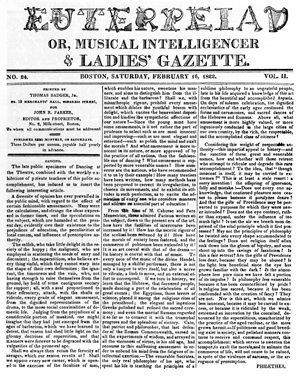The Euterpeiad, or Musical Intelligencer
Includes:
- Complete Introduction: English

Prepared by Liesbeth Hoedemaeker and Richard Kitson
1 volume (2002)

“The first true music periodical in the USA,” The Euterpeiad, or Musical Intelligencer: Devoted to the Diffusion of Musical Information and Belles Lettres, was published in Boston by Thomas Badger, Jr. Volume I (1 April 1820 to 24 March 1821) comprises fifty-two weekly issues, each containing four quarto pages. Volume II (31 March 1821 to 16 March 1822) comprises twenty-six issues, each containing eight quarto pages. With the appearance of the first issue of volume II, the journal was renamed The Euterpeiad, or Musical Intelligencer & Ladies’ Gazette owing to the inclusion of a section unrelated to music entitled the “Ladies’ Department”. Volume III was first issued bi-monthly, as an eight-page octavo publication, from 30 March to 14 September 1822, and then, as a sixteen-page monthly from October 1822 to March 1823. Two twenty-four-page numbers of a “New Series”—titled The Euterpeiad, or Musical Intelligencer; and Select Repository of Classic and Polite Literature—were issued without a “Ladies’ Department” in May and June 1823, at which point the journal ceased publication.
The first part of each issue is given over to histories, biographies, essays on music, and announcements of forthcoming concerts. Prominent among major articles is “A Brief History of Music from the Earliest Ages”— compiled from the histories of Burney and Hawkins—which occupies first place in the fifty-two issues of volume I. Also featured in the first section are biographies of composers such as Alessandro Stradella, Corelli, Purcell, Paisiello, Arne, Bianchi, singers including Mme Mara, Mrs. Billington, Mme Vestris, John Braham, William Harrison and Henry Incledon, the violinist Viotti, and the music theorist Padre Martini. Many of the biographies and series of articles such as “The Musical Student” and “Elements of Vocal Science,” originally appeared in Richard Mackenzie Bacon’s English periodical The Quarterly Musical Magazine and Review.
An outstanding contribution to the annals of American music history is the fourteen-part 1822 series—entitled “Musical reminiscences or biographical notices of several eminent musical characters, who have merely visited or domesticated in America, and who are deceased, returned to Europe, or have declined their professional avocations”— which contains biographical sketches recounting the early nineteenth-century musical activities of singers, pianists, organists and orchestral instrumentalists active in New York, Boston, Philadelphia, Baltimore, and Charleston.
The second part of each issue is given over to local interests, and features reviews of important musical events, of plays at the Boston Theatre, and of new music publications. The concerts (called oratorios) and publication activities of the Handel and Haydn Society are the subject of the majority of the journal’s reviews and announcements. Fewer than twenty reviews and announcements deal with the activities of the Philo-Harmonic Society, an association of musicians established for the purpose of presenting instrumental music to the Boston public. New musical instruments—the euphony, the guitar-lyre, the self-acting harp and panharmonicon—and devices with a pedagogical aim, such as Logier’s “chiroplast” and Galin’s “meloplaste” are regularly described. A critical appraisal is given of Anthony Philip Heinrich’s volume The Dawning of Music in Kentucky.
Musical supplements consisting of over seventy songs and simple pianoforte pieces were issued with many issues of The Euterpeiad. Scotch and Irish songs and ballads, favorite American songs of the period, and hymns are prominent. While many of these consist of a melody line and a bass line without harmonization, Lowell Mason’s hymn tunes “Andover” and “Bridgeport” are given in four-part harmonizations. Solo pianoforte selections include waltzes and marches.
The Euterpeiad was edited by John Rowe Parker (1777-1844), a music dealer and amateur musician. Little is known about Parker’s musical credentials and less is known about Charles Dingley who edited the journal’s final two issues.
